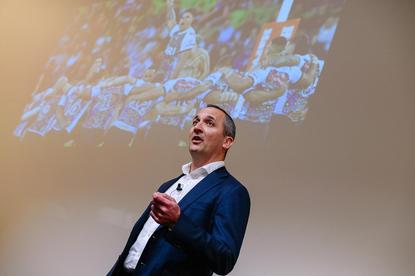NRL: Turning a challenged brand around
- 13 August, 2019 08:39

Andrew Abdo at CMO Momentum Sydney
There are few sporting codes with as much controversy surrounding them as the NRL.
It is arguably a brand that needs a turnaround, and that is just what it has been undertaking over the last few years.
Chief commercial officer at the NRL, Andrew Abdo, took to the stage at CMO’s Momentum event in Sydney on 8 August to discuss burning platforms and taking back control of the NRL narrative.
“The story of the NRL is a work in progress,” he explained. “We’re not perfect, but this is a good thing in many ways. We’ve been around 111 years, but as a business we’ve only been around for seven years. We were owned by News before that, and all this has presented us with a number of challenges.
“The game was fragmented, and therefore the brand has been damaged over decades over a conflict of interest and no clear direction.”
To combat this, the NRL has made several strategic decisions to overhaul the brand and operate more like an entertainment business. This has seen public sentiment start to change, and delivered big gains in revenue.
“We had to make a number of strategic decisions amid a challenging brand environment. State of Origin matches were the top three watched TV programs in 2018. So we know sport remains valuable, even in a declining and fragmented media landscape," Abdo said. “We are quite raw, but there is something magical about that; being unpolished, unfiltered and unscripted in a world that is becoming more homogenous. Perhaps there is value in purely unscripted, as long as it’s real, authentic and connects with the community in a positive way.”
It is this positive way the NRL has been concentrating on, launching community programs as well as a comprehensive marketing and digital strategy so it might better own its narrative.
“Our burning platform is a changing media landscape, massive changes in sport, and sponsorship that is now is all about ROI and tracking individual products and experiences sold, rather than just brand exposure," Abdo commented. "Attending live matches is also a bigger sacrifice for people who are time poor and have a lot of entertainment to choose from. So understanding our fans has never been more important. Sport is becoming like a business, and we do suffer from being classed as being ‘below’ other sports.
“We get a lot of negative media coverage, which doesn’t necessarily reflect the inner working of the game, and this shows the power of and the danger in others controlling your narrative."
NRL's brand campaign has been running for a couple of years now. Getting to that point required a lot of internal alignment. For Abdo, it's crucial to have a strong board and CEO behind you when it comes to change.
“We invested heavily in metrics, which we didn’t have before. These are metrics around getting to know fans, NPS, brand health, perceptions," he continued. “With that new brand strategy, we relaunched our brand. We moved away from NRL, to a premiership. What makes us great on the field and as a business is holding us back on a connection level."
In addition, the organisation is focused on two sub brands, touch football and League Stars, a non-contact after school program for kids. NRL has also invested in a digital media business. Creating a new media business from scratch and competing with the traditional media space was a tough ask, Abdo admitted.
"But it was important for us, and important to have our own channel and offer a single source of truth for our fans. It was an investment in telling the stories we needed to tell," he said.
“We also had to be authentic if we wanted to be inclusive, and develop an elite female pathway, on and off the field. We established a women’s premiership and pathways for women from grassroots all the way to the board table.
“We now also focus on product innovation, and entertainment products... All this has increased our revenue and fans.”
From 2013 to 2017, the NRL managed to increase revenue from $180 million to $550 million, in one of the most competitive sporting landscapes in the world. But with negative perceptions persisting around player behaviour, the focus is on addressing it by taking a strong stance on what the game stands for. This is the next burning platform, Abdo explained.
“We’ve met every single player, engaged with them, educated them on the impact on fans, and created some new rules which are not popular everywhere, but its important to send a message," he said. “Next year, the three biggest investments we will make will be female elite pathway, digital metrics, and creating a leadership culture among all our stakeholders.
“We don’t get everything right, but we have to take risks and sometimes they work and sometime they don’t, but you have to learn."
For Abdo, the key is to become more representative of what’s going on in the world. "We’ve seen how sport can unite people, and most importantly, how fans can tell their story for you," he concluded.
“It’s powerful, sport binds people together, but it can also be polarising. People on the outside have a narrative, and our job is to change that.”
Follow CMO on Twitter: @CMOAustralia, take part in the CMO conversation on LinkedIn: CMO ANZ, follow our regular updates via CMO Australia's Linkedin company page, or join us on Facebook: https://www.facebook.com/CMOAustralia.

